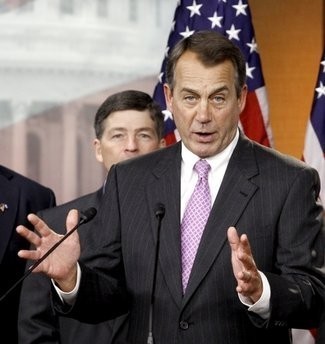The GOP ideas were modeled on savings that Obama himself had included in his budget for this year, suggesting that negotiations over ending the election-year impasse could take a serious turn. Until now, both sides have favored extending today's 3.4 percent interest rates on subsidized Stafford loans for another year but clashed over how to pay for it.
House Speaker John Boehner, Senate Minority Leader Mitch McConnell and other top Republicans made their proposals in a letter to Obama. They included savings from making it harder for states to collect some federal Medicaid reimbursements.
"There is no reason we cannot quickly and in a bipartisan manner enact fiscally responsible legislation," the letter said.
The leaders sent the letter on the same day that Boehner, R-Ohio, used a barnyard vulgarity in a meeting with GOP lawmakers to describe Democrats' efforts to use issues like the student loan fight to distract voters from the country's economic woes, said Boehner spokesman Michael Steel.
According to Steel, Boehner told his colleagues that it would be the Democratic-led Senate's fault if Congress and the White House stalemate and don't act before July 1, the day interest rates would automatically double to 6.8 percent. He also told them that even if there is a deadlock that day, Congress could retroactively reduce the interest rates later, making July 1 a phony deadline, said Steel.
The House approved a GOP-written bill paying for the extension by abolishing a preventive health program, but that measure has drawn a White House veto threat. Republicans derailed a Senate Democratic bill financing the interest rate extension by boosting payroll taxes on some high-earning owners of private companies.
White House spokesman Matt Lehrich drew a contrast between Boehner's effort to downplay the importance of the loan issue with the letter suggesting the two sides work together, adding, "The president will work with members of both parties to prevent the interest rate from doubling."
A 2007 law gradually reduced Stafford interest rates but let them bounce back to 6.8 percent this July 1 in a money-saving move.
Also Thursday, the Federal Reserve Bank of New York said total student loan debt rose to $904 billion in the first three months of this year, a $30 billion increase that occurred even as overall consumer debt has been declining. Outstanding student loans far outweigh the $679 billion owed on credit cards.
In their letter to Obama, Boehner and McConnell, R-Ky., suggested that one way of paying to extend student loan interest rates would be to gradually increase the amount that federal workers contribute to their pensions by 1.2 percent over the next three years. That suggestion, included in Obama's budget, has run into opposition in the past from lawmakers from areas with many civil servants.
As another option, the GOP leaders suggested combining three ideas.
The largest would limit the taxes most states impose on hospitals, nursing homes and other providers that are used to qualify for higher federal Medicaid payments.
States can currently impose taxes of up to 6 percent on providers, but under a House-approved provision that threshold would be reduced to 5.5 percent, in effect reducing federal Medicaid reimbursements to states. The administration has proposed reducing the level to 3.5 percent.
The Republicans also proposed two other savings embraced by Obama.
One would limit to six years the time during which students in four-year undergraduate programs could receive federal subsidies on Stafford loans. Until now, students have not been charged interest on their Stafford loans while they were still studying, even if they were in school for longer than six years.
The second would require state and local pension officials to report more information about their civil servants to Washington so federal officials could better identify whether any were receiving Social Security benefits to which they are not entitled.

House Speaker John Boehner (AP file photo)
http://accesswdun.com/article/2012/5/249213
